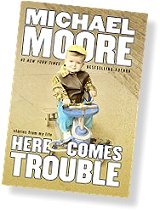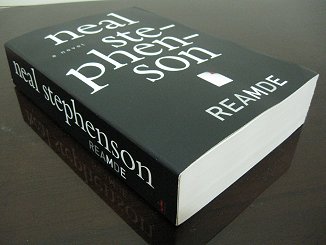I stopped reading Counterpunch years ago because of similar feelings, though Moore's leftist Kool-Aid is less toxic; haven't they heard about the chill pill?

With the exception of Mike's Election Guide which I reviewed in my previous job, I never bothered with his other books. After a while, they all sound the same. At least he's consistent.
Then the Guardian published this excerpt from his upcoming book, Here Comes Trouble, just in time for the tenth anniversary of 9/11. Perhaps no other title aptly describes the memoir about America's most hated man, who panned his president when the nation was at war.
Given his uncanny button-pushing talents, the backlash was tremendous. He'd been verbally, digitally and physically assaulted; his property trespassed; and a whole lot more. It got to a point where he had to hire bodyguards, most of whom were former soldiers and SEALs - a bit ironic, considering his circumstances.
Then came the day someone was arrested for allegedly plotting to blow up Moore's house. Moore despaired over this for a time.
For me, it was the final straw. I broke down. My wife was already in her own state of despair over the loss of the life we used to have. I asked myself again: what had I done to deserve this? Made a movie? A movie led someone to want to blow up my home? What happened to writing a letter to the editor?
Yeah, why don't they write letters to the editor anymore? After all, not everybody is comfortable with the idea of parading and stepping on cow heads, burning churches, or throwing rubber snakes and newspapers into a possibly illegal bonfire.
That wannabe Guy Fawkes' plan was almost as sickening as former Fox News rabble-rouser Glenn Beck announcing his "urge" to kill Moore (and it seems, getting away with it), and Fox's Sean Hannity hosting a trespasser of Moore's house.
Are these are the kinds of freedoms that Dubya Bush said the "terr'ists" hate, the kinds that should be defended by toppling governments who don't like you - by force?
A decade after 9/11, Moore must feel vindicated. He'd been, at least, right about the Iraq war. But I find the closing anecdote in that Guardian extract a bit incredible.
As I do this over-the-top blurb on the book on the web site:
Moore is his own meta-Forrest Gump, at one moment he's an 11-year-old boy stuck on a Senate elevator with Bobby Kennedy, and the next moment he's inside the Bitburg cemetery with a dazed and confused Ronald Reagan. Changing planes in Vienna, he escapes death at the hands of the terrorist Abu Nidal.
In search one day for a bag of potato chips, he ends up eliminating racial discrimination in private clubs across America. He founded his first underground newspaper in the fourth grade. He refused to be on the CBS Evening News with Walter Kronkite at 16. And he became the youngest elected official in the country at age 18 by enlisting an "army of local stoners" as his campaign staff.
All of this makes for great fiction — but every one of these stories is true and from the life of one Michael Moore who became an iconic voice for progressives everywhere. But before Michael Moore became the Oscar-winning filmmaker and all-round thorn-in-the-side of corporate and rightwing America, he was the guy who had an uncanny knack for just showing up where history was being made.
Trouble, says Moore, is coming to you on 13 September. I might keep an eye out for it. With button-pushers like him, however, I'd do the pinch-of-salt thing because what he dishes out can be hard to swallow.
Categories:
Book Blab



